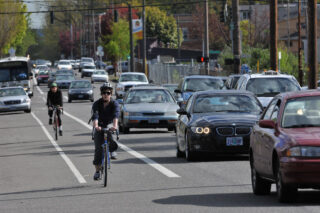
By spring of next year Metro Council is expected to decide whether or not they should send a major transportation investment measure to the ballot. Dubbed T2020, efforts to shape where and how new revenues would be spent are heating up.
This week Metro is hosting community forums in all three counties. Washington and Clackamas county have already had theirs and the Multnomah County event will happen tomorrow (Thursday, 10/24). Also this week a new poll has come out (first reported by Willamette Week) that sheds light on how some people think the money should be invested.
The poll (PDF) of 700 people was conducted by FM3 Research in the first week of October both online and via phone. Among the findings is that 55% of respondents said they’d be willing to spend $300 a year in taxes to raise money for transportation investments. That number went up to 61% at $200 a year. 57% of respondents said yes after they were asked if they’d be willing to pay higher taxes “for projects that reduce traffic and improve transit.”
Combined with the fact that 89% of respondents said traffic in our region “is reaching a crisis point” should give Metro confidence that the timing is right for this measure.
But the big question is: What type of investments should be prioritized and how can the measure be framed most effectively to guarantee it passes by a safe margin?
When it came to questions that were more specific about how the money should be spent, the results showed an unsurprisingly driving-centric bias that was exacerbated by the survey questions themselves.
Advertisement
86% of the poll respondents said they mostly drive alone. When asked if “balancing investments between bus, light rail and roadway improvements that keep cars from idling in gridlock”, 72% of them said that was the right approach. When asked if new revenue should only be focused on transit, biking, and walking and, “shouldn’t support any transportation investments that include road-widening or freeway improvements,” just 15% agreed.
The Willamette Week said this shows “Most Portlanders aren’t ready to stop widening roads”, climate change be damned. That’s not the only way to read this poll.
It’s important to know who was polled. Less than half of the respondents were Portlanders and 50% of people polled live outside Multnomah County. 81% identified as homeowners (to just 14% who rent) and 77% where white.
The results also show a strong majority of support to improve transit. Despite just 41% of respondents saying they use transit regularly, 67% of survey respondents said better transit would improve commutes, 67% said they believe we can reduce traffic if we make it, “easier for some people to get around without a car” and 61% percent said they agree that, “Better transit service would mean less traffic.”
When given seven “focus issues” for the potential ballot measure – growth, equity, traffic, economy, safety, and climate — the one that came out with the most support was safety. A measure that would, “rebuild and strengthen roads, bridges, and transit lines to be earthquake-safe,” and “would address dangerous intersections and roadways while building and improving sidewalks, bike lanes, and safe routes to school to ensure the safety of people walking, biking, and driving,” was supported by 76% of respondents. A measure that would, “focus on redesigning and improving streets and traffic signals to improve traffic flow,” received 68% support.
This poll will likely come up at tomorrow’s community forum. Hopefully it’s seen as just one piece of the feedback puzzle as volunteers and electeds weigh the best path forward.
Multnomah County T2020 Community Forum
Thursday, Oct. 24, 6 to 8 p.m.
The Orchards of 82nd
8118 SE Division St., Portland
Sponsored by PGE and NW NaturalJohn Horvick, director of political research at DHM Research, will moderate a panel that includes
– Walter Robinson II, Getting There Together Coalition
– Ashton Simpson, Rosewood Initiative
– Emerald Bogue, Port of Portland
– Nolan Rinehart, ZGF Archictects
— Jonathan Maus: (503) 706-8804, @jonathan_maus on Twitter and jonathan@bikeportland.org
— Get our headlines delivered to your inbox.
— Support this independent community media outlet with a one-time contribution or monthly subscription.

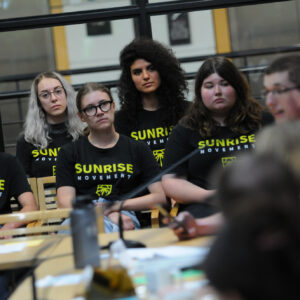
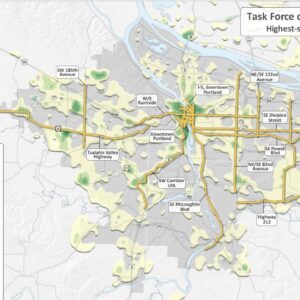
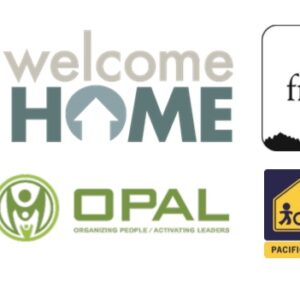
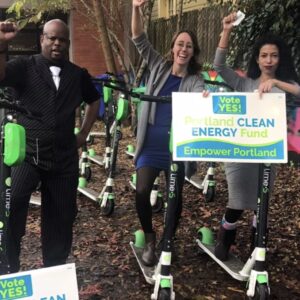
My understanding is that Metro serves all three counties, and since fewer than half of the Metro residents live in Multnomah County, why should it be unreasonable to expect that fewer than half of the respondents would come from Multnomah? 77% white is fairly reflective of the Metro area population, while the owner/renter ratio is reflective of who is willing to respond to surveys these days.
Had it been in any major urban metro area of NC and the same ratios, then there would have been hell to pay. And for most people here, African-Americans included, increased safety = more freeways, even when faced with overwhelming evidence to the contrary. So take heart that Oregonians responded so positively to transit and alternative modes, at least relative to the rest of the USA.
Given that Metro serves 3 counties, one assumes that Multnomah, Clack, and Wash Co, are all treated equally. If so, the relative voting power of Metro is diluted to disproportionately value the votes of suburban voters over the votes of urban voters, given that Multnomah county is primarily urban and the other two counties more suburban in character. The power of the Metro council vote is different depending on what county one lives in. This is the same phenomenon that has bastardized the original intent of the constitution. Rural / suburban areas with fewer people have more voting/ policy power than those areas of urban character (see Senate representation vs House representation). While this survey is interesting, it should be done in a matter to preclude selection bias to suburban voters, based on population distribution. I doubt this occurred, but if it did, please correct me.
Our federal constitution give special powers (Senate, electors for President, it only takes 1/3rd of states to block any constitutional amendment) to small states partly as a check and balance to mass democracy, which most of our so-called founding fathers abhorred; partly because the the constitution of 1787 was written under the Articles of Confederation of 1775 which gave every province an equal vote and required a unanimous vote to pass anything, including a new constitution; but the main reason was that tiny Rhode Island threatened to leave the union and sell the Newport naval base to the highest bidder (i.e. France or Britain), creating a new Gibraltar in the middle of the colonies. Our resulting constitution was the bid from the other 12 to get RI to stay.
I remember watching a news story way back when the westside blue line opened and all the people they interviewed said they were happy the light rail line would be there, though none of them said they would be riding it themselves.
There were in favor of the train because maybe other people would ride it, making their own drive over the hill on 26 easier.
Nowadays, the mentality seems to be if I’m not gonna use it, I don’t wanna pay for it, as these people collectively shoot themselves in the foot.
Hopefully, ten buck gas and rationing will change a few minds. It’s coming. Better sooner rather than later. It’s already over five buck in California.
$2.44 at the gas station I bike by every day here in Greensboro NC.
https://gasprices.aaa.com/
Interesting map on that page. The most expensive category, red, which covers the entire West, spans all the way from $2.75 to $4.10 which is a buck-thirty-five, whereas all the other divisions span about a dime, or in one case, 19 cents. If they’re claiming there’s no appreciable difference between $4.10 and $2.75, I beg to differ. Seems like a finer breakdown of that range, visually, would be of interest. But, you can hover over each state to get a statewide average.
It’s been “any day now” for 20 years. Apocalypse porn.
More like a failure of the political leadership of the region/state to charge the true cost of driving through gas taxes or other fees. SOVs are heavily subsidized by all of us.
A lot of things are heavily subsidized. I suspect if people paid the true cost for everything, they’d have second thoughts.
This is shaping up to be the first tax I’ve ever voted against. It’s worse than objectionable, it’s completely uninspired. A smorgasboard of pork to make everyone (that commutes in a car) a little bit happy, with no bold vision to rally behind. I only wish I could make the forum tonight to comment similarly.
The vision is get something that can pass by offering a smorgasbord of pork to make everyone a little bit happy, then try to make the best of what gets passed.
Something with “bold vision” (especially as you would likely define it) would never pass in this political climate, sadly.
How did it just pass in the Seattle Metro, less than 3 years ago? I disagree with your assessment, I think it’ll make no one happy enough.
I’d be happy to be proven wrong, as I would love an “assertive” measure that acknowledged and started to address the reality of global heating, but Metro Council apparently agrees with me, and theirs is the only opinion that matters.
Call it the Bacon Bill. Everyone but vegans and vegetarians will love it.
T2020 is no longer the moniker. Too like a future political campaign.
Ugh, but we had it first! He ruins EVERYTHING.